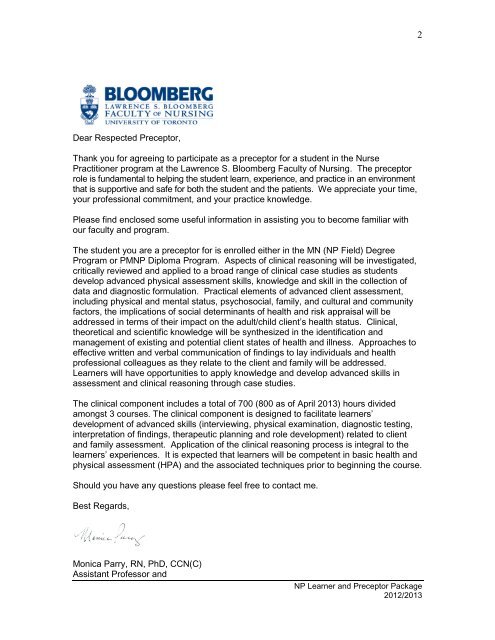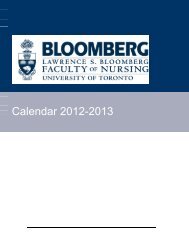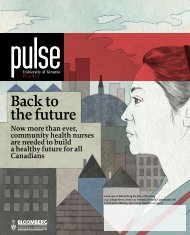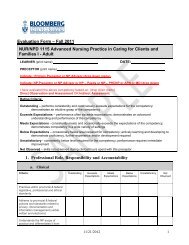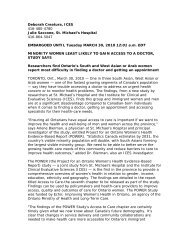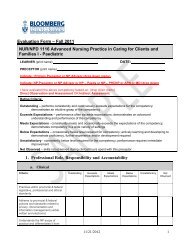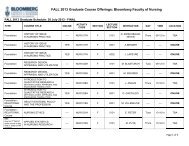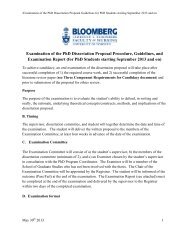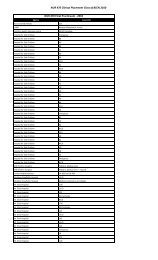Nurse Practitioner Learner and Preceptor Information Package
Nurse Practitioner Learner and Preceptor Information Package
Nurse Practitioner Learner and Preceptor Information Package
Create successful ePaper yourself
Turn your PDF publications into a flip-book with our unique Google optimized e-Paper software.
2<br />
Dear Respected <strong>Preceptor</strong>,<br />
Thank you for agreeing to participate as a preceptor for a student in the <strong>Nurse</strong><br />
<strong>Practitioner</strong> program at the Lawrence S. Bloomberg Faculty of Nursing. The preceptor<br />
role is fundamental to helping the student learn, experience, <strong>and</strong> practice in an environment<br />
that is supportive <strong>and</strong> safe for both the student <strong>and</strong> the patients. We appreciate your time,<br />
your professional commitment, <strong>and</strong> your practice knowledge.<br />
Please find enclosed some useful information in assisting you to become familiar with<br />
our faculty <strong>and</strong> program.<br />
The student you are a preceptor for is enrolled either in the MN (NP Field) Degree<br />
Program or PMNP Diploma Program. Aspects of clinical reasoning will be investigated,<br />
critically reviewed <strong>and</strong> applied to a broad range of clinical case studies as students<br />
develop advanced physical assessment skills, knowledge <strong>and</strong> skill in the collection of<br />
data <strong>and</strong> diagnostic formulation. Practical elements of advanced client assessment,<br />
including physical <strong>and</strong> mental status, psychosocial, family, <strong>and</strong> cultural <strong>and</strong> community<br />
factors, the implications of social determinants of health <strong>and</strong> risk appraisal will be<br />
addressed in terms of their impact on the adult/child client’s health status. Clinical,<br />
theoretical <strong>and</strong> scientific knowledge will be synthesized in the identification <strong>and</strong><br />
management of existing <strong>and</strong> potential client states of health <strong>and</strong> illness. Approaches to<br />
effective written <strong>and</strong> verbal communication of findings to lay individuals <strong>and</strong> health<br />
professional colleagues as they relate to the client <strong>and</strong> family will be addressed.<br />
<strong>Learner</strong>s will have opportunities to apply knowledge <strong>and</strong> develop advanced skills in<br />
assessment <strong>and</strong> clinical reasoning through case studies.<br />
The clinical component includes a total of 700 (800 as of April 2013) hours divided<br />
amongst 3 courses. The clinical component is designed to facilitate learners’<br />
development of advanced skills (interviewing, physical examination, diagnostic testing,<br />
interpretation of findings, therapeutic planning <strong>and</strong> role development) related to client<br />
<strong>and</strong> family assessment. Application of the clinical reasoning process is integral to the<br />
learners’ experiences. It is expected that learners will be competent in basic health <strong>and</strong><br />
physical assessment (HPA) <strong>and</strong> the associated techniques prior to beginning the course.<br />
Should you have any questions please feel free to contact me.<br />
Best Regards,<br />
Monica Parry, RN, PhD, CCN(C)<br />
Assistant Professor <strong>and</strong><br />
NP <strong>Learner</strong> <strong>and</strong> <strong>Preceptor</strong> <strong>Package</strong><br />
2012/2013


